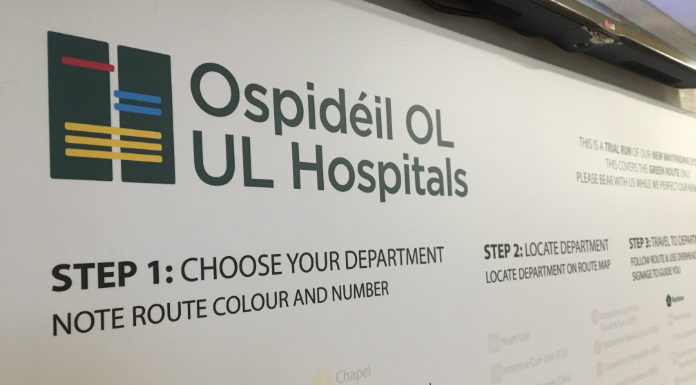More than 2,300 have joined waiting lists for outpatient procedures at the region’s main hospital in the past year.
Over 43,000 people are now in need of appointments at University Hospital Limerick, a figure that’s been exacerbated by the pandemic and the cyber attack on the HSE.
In August 2020, just after the first wave of COVID-19, there were 41,338 people waiting for appointments at UHL.
That number has jumped by just over 5 percent in 12 months to 43,656.
It means nearly 1 in 10 people in the Midwest region of Clare, Limerick and Tipperary are waiting for outpatient procedures in Dooradoyle.
More than half of these patients have been waiting more than a year, with 19,600 people waiting longer than a year and a half.
Over 2,000 patients are waiting in Ennis General Hospital for outpatient appointments.
The numbers waiting for inpatient services have fallen significantly in 12 months though – by 27 percent in Ennis and by 22 percent in Limerick.
The UL Hospitals Group says ‘work is continuing on a number of fronts’ to manage waiting lists, including ongoing recruitment of consultants and providing additional bed capacity.
The Group says it’s referred 2,440 urgent surgical and medical cases to private hospitals under the national Safety Net Service Agreement and that this will continue for its full 12 month term.
It says addressing ‘access and waiting list challenges’ is a priority in the HSE’s corporate plan for the next three years.
UL Hospitals Group statement:
Working to provide access to care for those who need it, in the right place at the right time, is a major focus and priority for UL Hospitals Group. This objective has also been significantly challenged by the COVID-19 pandemic that has completely transformed how public healthcare is delivered in this country and worldwide.
During 2020, the national strategic response to COVID-19 resulted in a significant reduction of planned activity across the country’s acute hospital services, including outpatient, inpatient and day-case activity. Due to the new and high risks to patients and staff from COVID-19, scheduled care activities had to focus on urgent and time-critical procedures and appointments.
Over the past nine months, there have been further disruptions of the health service nationally, due not only to the third surge in COVID-19-related care needs in the early months of 2021, but also to the May 2021 cyber attack on the HSE’s IT systems. Throughout, hospitals and community healthcare services have been working hard to safely and effectively restore levels of activity.
It should also be noted that throughout the pandemic, hospitals and other healthcare facilities have had to significantly revise workflows around social distancing and other Infection Prevention & Control measures, in order that staff and the most vulnerable members of our communities would be protected from COVID-19. Another significant factor to be considered in the management of waiting lists is that there is no large sub-Acute Private Hospital serving the Mid-West Region.
With regard to measures UL Hospitals Group is taking to manage waiting lists, work is continuing on a number of fronts, including the creation of additional bed capacity across the Group sites since the middle of 2020. The measures include ongoing review of lists, ongoing recruitment of consultants, and referral of urgent surgical and medical cases to the National Treatment Purchase Fund, and the Private Hospital Safety Net Service Agreement.
Executive Oversight Meetings are held weekly to review our waiting lists, and we have been active in devising and implementing ways to minimise the inconvenience that wait times cause for patients and their loved ones.
Over the past six months, UL Hospitals Group has appointed 13 consultants in new and replacement posts in Anaesthesiology, Radiology, Neonatology, Medicine, Histopathology, Oncology, Paediatrics and Surgery. The Group has also been approved for the appointment of a further 36 new Consultant posts by the HSE to support our new developments on site. We are currently progressing with these through the regulatory framework process with the Consultants Application Advisory Committee (CAAC), and we anticipate that many of these posts will be advertised for filling in the coming months.
Under the Private Hospital Safety Net Service Agreement, UL Hospitals Group has referred urgent surgical and medical cases to private hospitals. The latest available data from Friday September 10th shows that there have been 2,440 cases referred to private hospitals. It is anticipated that this activity will continue under the national agreement, which has a term of 12 months.
UL Hospitals Group is also discussing initiatives with the National Treatment Purchase Fund (NTPF), and wherever possible, virtual clinics are used across our services as a means of identifying patients who can be progressed to in-person treatment, whether for diagnostic imaging, minor procedures, or full episodes of care.
Enhanced access to scheduled care has been highlighted by the Department of Health as a priority for inclusion in the HSE’s 2021 Service Plan, and the need to address access and waiting list challenges is a key strategic priority in the HSE’s corporate plan for the next three years. It is a key priority also of Sláintecare. In this, the HSE has established a Scheduled Care Transformation Programme to ensure a sustained, system-wide transformation process that tackles the challenge of scheduled care waiting times, improves access to scheduled care services, and ensures the safe delivery of care in the context of the on-going pandemic.








